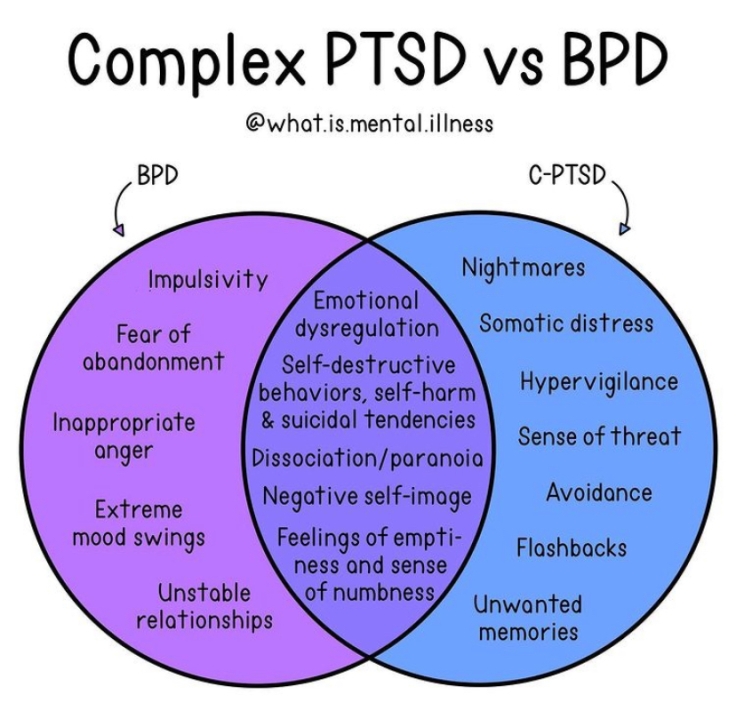What Trauma Causes Borderline Personality Disorder
Borderline Personality Disorder (BPD) and Complex Post-Traumatic Stress Disorder (C-PTSD) are two mental health conditions that can be debilitating for individuals who suffer from them. It is important to understand the differences between these two disorders in order to get an accurate diagnosis and proper treatment. BPD is a mental health disorder characterized by unstable moods, behavior, and relationships. Individuals with BPD often struggle to regulate their emotions, which can result in impulsive behavior, intense conflicts with others, and a distorted sense of self-identity. C-PTSD, on the other hand, is a type of PTSD that is caused by chronic and repeated trauma, rather than a single traumatic event. Common symptoms of C-PTSD include feelings of helplessness, dissociation, emotional numbness, and a distorted sense of time. While the two disorders share some similarities, it is important to differentiate between them in order to receive proper treatment. If you or someone you know is struggling with BPD or C-PTSD, it is important to seek help from a mental health professional. Treatments like psychotherapy, medications, and support groups can help individuals manage their symptoms and live a fulfilling life.
Understanding Borderline Personality Disorder

Borderline Personality Disorder is a complex mental health condition that can be difficult to diagnose and treat. It is characterized by a pattern of unstable relationships, self-image, and mood swings. Individuals with BPD often struggle to manage their emotions and may engage in impulsive behavior such as substance abuse, self-harm, or risky sexual behavior.
In addition to these symptoms, individuals with BPD may also experience feelings of emptiness, difficulty with interpersonal relationships, and a pervasive fear of abandonment. These symptoms can make it challenging for individuals with BPD to maintain healthy relationships, hold down a job, or pursue personal goals and dreams.
Understanding Complex Post-Traumatic Stress Disorder

Complex Post-Traumatic Stress Disorder is a type of PTSD that is caused by chronic and repeated trauma, rather than a single traumatic event. This includes experiences such as ongoing abuse, neglect, or living in a war zone. Individuals with C-PTSD may experience symptoms such as anxiety, depression, and feelings of helplessness or hopelessness.
In addition to these symptoms, individuals with C-PTSD may also experience emotional flashbacks, dissociation, and difficulty with interpersonal relationships. These symptoms can have a significant impact on an individual's quality of life, making it difficult to maintain a job, engage in healthy relationships, or pursue personal goals and dreams.
Treatment for BPD and C-PTSD
While each individual's treatment plan will vary depending on their specific needs, there are a few treatment options that have been found to be effective for individuals with BPD and C-PTSD.
Psychotherapy is an important part of treatment for both disorders. This includes talk therapy, cognitive behavioral therapy, and dialectical behavioral therapy. These therapies can help individuals learn coping skills, work through past trauma, and develop a more positive sense of self-identity.
Medications can also be helpful in managing symptoms of BPD and C-PTSD. Antidepressants and anti-anxiety medications may be prescribed to help control feelings of depression, anxiety, and PTSD symptoms.
In addition to these treatments, support groups can be a valuable resource for individuals with BPD and C-PTSD. Support groups provide a safe space to share experiences and connect with others who may be going through similar challenges.
Conclusion
Borderline Personality Disorder and Complex Post-Traumatic Stress Disorder are two complex mental health conditions that can be difficult to diagnose and treat. While they share some similarities, it is important to differentiate between the two in order to receive proper treatment.
If you or someone you know is struggling with BPD or C-PTSD, it is important to seek help from a mental health professional. With the right treatment and support, individuals with these conditions can learn to manage their symptoms and live a fulfilling life.